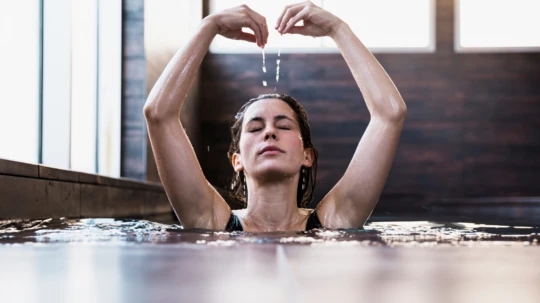Taking an ice bath, a practice where individuals immerse themselves in ice-cold water has gained popularity among athletes, fitness enthusiasts, and those seeking its health benefits.
This method, also known as cold water immersion, is believed to speed up recovery, reduce muscle soreness, and improve overall well-being. But what exactly happens to your body when you take an ice bath? Let’s dive into the physiological changes and potential benefits of this chilling practice.
Immediate Physiological Response
When you submerge your body in an ice bath, the first thing you experience is an intense shock of cold. This sudden drop in temperature causes your blood vessels to constrict, a process known as vasoconstriction. This constriction reduces blood flow to the extremities and shifts blood towards your core to protect vital organs and maintain body temperature.
Reduced Inflammation and Muscle Soreness
One of the primary reasons athletes take ice baths is to reduce muscle soreness after intense workouts. The cold water helps lower the temperature of damaged tissue and constricts blood vessels, reducing inflammation and metabolic activity around the injured muscles. This process, in turn, can decrease the amount of muscle soreness experienced in the days following a strenuous exercise session, known as Delayed Onset Muscle Soreness (DOMS).
Enhanced Recovery
Beyond reducing inflammation, ice baths can facilitate the removal of waste products, such as lactic acid, that accumulate in muscles during physical activity. By constricting blood vessels and then allowing them to dilate once you’re out of the cold, a flushing mechanism is created. This process helps to clear out metabolic waste, speeding up the muscle’s recovery process.
Boost to the Immune System
Regular exposure to cold water can stimulate the lymphatic system, which is responsible for helping the body eliminate toxins and waste. The contraction and relaxation of muscles during cold water immersion aid in pushing lymph fluid throughout the body, which can help boost the immune system by increasing the production of white blood cells.
Improvement in Circulation
Although ice baths initially cause vasoconstriction, the subsequent rewarming of the body induces vasodilation, or the widening of blood vessels. This process can improve circulation by forcing the body to adapt to the changing temperatures. Improved circulation not only aids in faster recovery but also promotes overall cardiovascular health.
Mental Resilience and Mood Enhancement
The challenge of enduring the cold can also have positive effects on your mental health. Ice baths can increase mental toughness, reduce stress, and even improve mood. The exposure to cold triggers the release of endorphins, the body’s natural painkillers and mood elevators, leading to a feeling of euphoria often referred to as the “cold rush.”
Considerations and Precautions
While ice baths can offer numerous benefits, they are not without risks. It’s important to limit immersion time to avoid hypothermia, a condition where the body’s core temperature drops to dangerously low levels. Typically, 10-15 minutes is sufficient for experiencing the benefits without undue risk.
Individuals with cardiovascular conditions should exercise caution, as the cold can cause a significant increase in blood pressure. Consulting with a healthcare provider before starting any form of cold therapy is advisable.
Ice baths can be a powerful tool for recovery, health, and mental resilience. By understanding what happens to your body during this process, you can safely incorporate ice baths into your routine to harness their benefits. Whether you’re an athlete looking to improve recovery times or someone exploring ways to boost your overall well-being, the icy plunge might just be the invigorating experience your body needs.


